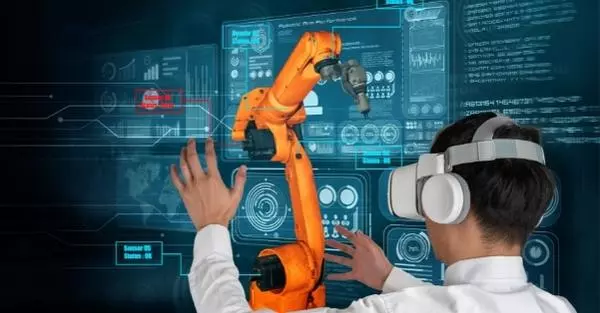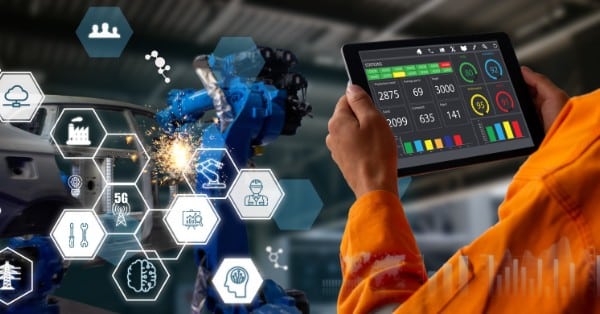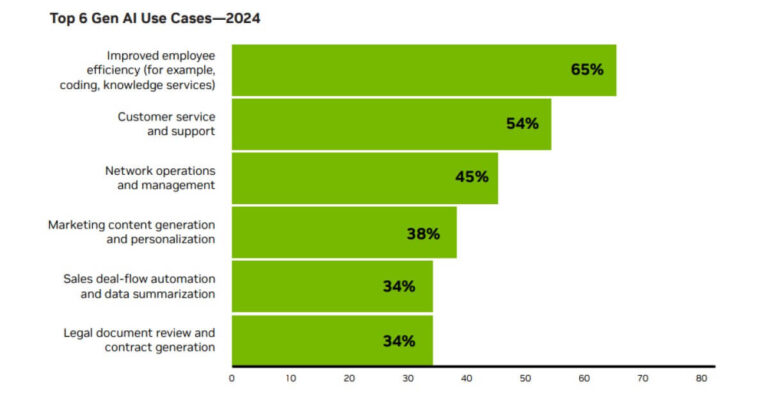Small businesses struggled for years against big businesses because of their superior budgets, extensive teams and enhanced resources. Today, AI technology enables small business owners to optimize their operations and market their products better while delivering superior customer interactions at reasonable prices. Modern technology has enabled small companies to use AI applications as strategic assets. The modern world allows businesses with limited resources to exploit AI technologies, which enable them to grow efficiently and outstrip their bigger competition across essential service areas while staying affordable.
This article delves into how AI is revolutionizing the small business landscape, narrowing the gap with big corporations, and helping you know the AI implementation strategies for small businesses.
The Role of AI in E-Commerce
AI in e-commerce is a game changer as it helps automate tasks, improve customer experiences, and provide much-needed insights regarding consumer behaviour.
Personalized Shopping Experiences
By analyzing the browsing history, purchase behaviour and preferences, the AI tailors the product recommendations. It creates more user interaction and upsells with relevant products that complement an individual’s interests. Personalized shopping enhances customer satisfaction, boosts conversion rate and leads to better repeat purchase experience, thus turning online businesses into more intuitive and efficient ones.
Chatbots and Customer Support
Instant, 24/7 customer support via AI-powered chatbots answering customer questions and helping to purchase merchandise helps in resolving issues easily. Virtual assistants such as chatbots aim to reduce the human workload, improve response times, and increase user experience. The advanced version of the chatbot uses natural language processing (NLP) in delivering personally tailored interactions. This makes online shopping much smoother and friendlier to the customer.
AI-powered marketing
Targeted advertising, automated email campaigns and personalized promotions are conducted using AI. Analysis of customer data allows you to segment the audience and deliver the right marketing message. It may also enhance the qualities of customer retention, engagement and conversion ratios in the e-commerce space for smaller businesses. Thus, helps to tilt the e-commerce playing field toward smaller businesses competing against larger brands.
Inventory and Supply Chain Optimization
AI implements forecasting algorithms to detect market trends and it controls inventory processes and boosts supply network operations. The system decreases overstock conditions and stockouts which results in reduced operational expenses together with diminished waste. AI-powered smart inventory systems help businesses achieve their optimal product level,s which enhances their order fulfillment operations while improving productivity throughout their facilities.
Fraud Detection and Cybersecurity
eCommerce security has improved through the use of AI, which helps to identify suspicious transactions, detect fraud patterns and protect from cyber threats. Real-time transaction data is analyzed by machine learning algorithms to flag accusations and thereby reduce financial risks. Cybersecurity that is protected by AI measures prevents specific customer information from being sensitive, builds trust, and protects businesses from fraud and data breaches.
Integration of AI through the e-commerce business reduces the cycle of operations, increases customer satisfaction, and keeps them competitive in the fast-growing digital e-commerce of today’s times.
How Small Businesses Can Leverage AI
Artificial Intelligence (AI) is no longer exclusive to large corporations—small businesses can harness its power to improve efficiency, enhance customer experiences, and drive growth.
Personalization and Customer Experience
Large operational scales cost a lot on AI recommendation system development of an e-commerce platform. A small business must learn about the main systems using AI tools that can be implemented based on the need of the business.
- NOSTO and Dynamic can help small retail stores by presenting proper product recommendations to their registered customer base.
- The Algolia AI upgrade helps customers to speed up product discovery by making it possible to locate items through the Autocomplete technology in searches.
- The features of Prisync enable businesses to use to identify pricing patterns and to track product costs of competitors so that strategic price recommendations can be developed.
AI-Powered Chatbots and Virtual Assistants
Online organizations set goals based on exceptional delivery of customer service to their business. ManyChat and Drift and Tidio’s AI powered chatbots are used to get away with business operation functions by small enterprises.
- Customers should receive replies from your business without any service limits the moment they ask you a question.
- It analyzes each customer’s past item exploration and the system creates custom recommendation deals.
- At the same time, it monitors orders and customer questions to reduce the workload of human business beings.
AI-Driven Marketing Automation
AI allows small businesses to build analytical-based marketing approaches. AI-powered platforms like HubSpot, Mailchimp, and Jasper AI help businesses:
- Through its behavior monitoring, Artificial Intelligence can create custom-made email communication segments for customers.
- Recent statistics state that more than 90 % of business leaders agree that automation improves the decision making process. Many businesses use AI monitoring tools to get the vital trend data that can assist them in deciding excellent content and perfect posting ways.
- With the perfect advertisement spending plans at Adzooma, businesses get maximum advertisement return on investment through AI based solutions.
AI for Inventory and Supply Chain Management
Customer need forecasts that help the small business make strong inventory management systems and save money by cutting down on product waste are just possible with AI technology. Tools like TradeGecko and Luminate help with:
- The system reduces the overstocking situations with help of AI pattern recognition functionality and prevents stockouts.
- AI based systems automatically generate purchase orders as the inventory levels are tracked and stock quantities are required.
- Small companies rely on AI technology to run with quality suppliers and find out the very best delivery route for their supply networks.
AI for Fraud Detection and Cybersecurity
With cyber threats growing, workplace rigidity poses itself as a serious threat to small businesses; that is when AI-powered tools like Kount and Signifyd play a vital role in detection tools.
- This technology is used by the system to detect abnormalities quickly and then identify unorthodox transaction activities.
- In input, AI systems evaluate potentially fraudulent transactions before the time of processing and prevent the transactions from reaching the processing period.
- AI security solutions provide two purposes to any organization, i.e detection of data breaches and privacy with privacy compliance in the legislation.
AI Implementation Strategies for Small Businesses
Small businesses adopt AI technologies to improve operational efficiency while they also strengthen their relationships with clients and boost their selling capacity. A small business needs to use the following basic strategies during the implementation of AI systems:
Start Small and Scale Gradually
AI applications at affordable rates let small businesses launch their operations with chatbots and automated email marketing tools throughout their journey toward reaching corporate goals. The establishment of AI deployment steps is essential for business requirements when they design their organizational AI process.
Use AI-Integrated Platforms
The e-commerce providers Shopify and WooCommerce, as well as BigCommerce, give their users AI-based product suggestions alongside messaging automation through their platforms. These instruments function wonderfully well without technical requirements, thus making them attractive for use in business process optimization.
Leverage AI for Competitive Analysis
SEM rush, combined with Crayon, provides its business customers with AI-based market strategy monitoring tools to boost their competitive market position.
Prioritize Customer Data and Insights
Organizations improve their customer retention rates through enhanced service delivery by procuring access to customer-related data. Organizations research subscriber tendencies to develop appropriate solutions which they deliver alongside promotional deals.
Invest in AI-powered content Creation
The business management sector benefits twice because AI content production tools through Copy.ai and Jasper combine marketing help with time reduction. Small businesses create steady online brand awareness by using these available tools for business management.
AI integration into business systems enables small businesses to boost productivity and make strategic choices that secure their market standing.
Conclusion
Through AI-enabled digital markets small businesses have gained opportunities to compete with their market competitors. Small businesses that use AI tools in personalization strategies and marketing systems and inventory management and protective measures enhance customer relations and operational performance while promoting market expansion. Any small enterprise should use AI technology to maintain market competitiveness in the continuously evolving e-commerce sector.


















